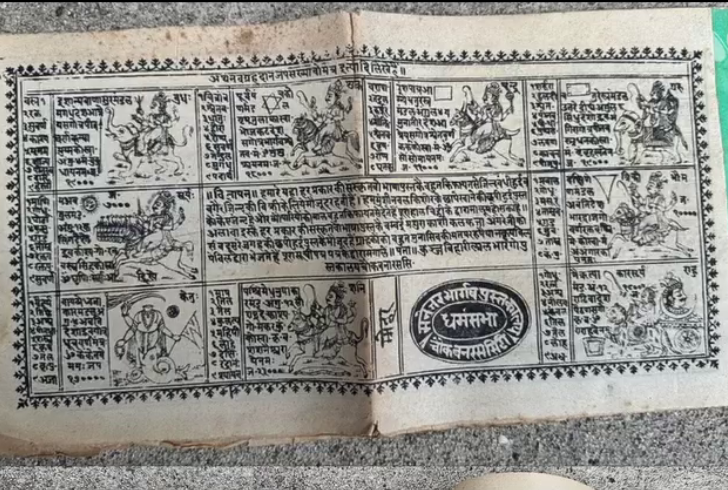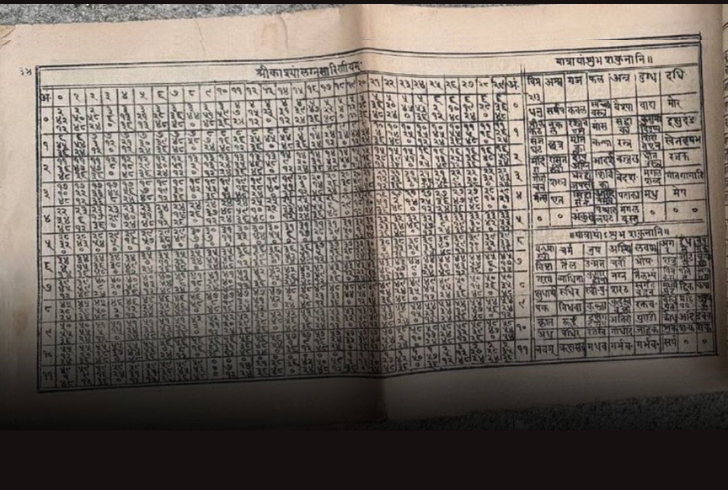A man in Hamburg, Germany, made an exciting discovery that amazed people all over the world. While exploring a flea market, he found an old Sanskrit text. Without wasting time, he shared photos of it on Reddit and asked for help. Almost immediately, users from different backgrounds joined the conversation. They shared their thoughts and theories about the mysterious text, which sparked everyone's curiosity.
The Hindu Calendar Found in Hamburg
In his Reddit post, the man uploaded pictures of two yellowed pages. These pages were covered in Devanagari script, which is used for Sanskrit and Hindi. Since the script was unfamiliar to him, he asked, “Found this at a flea market in Hamburg, Germany. Can anyone tell me what it is?” Soon, one user recognized it. They explained that the text was a “Panchang,” a Hindu calendar and almanac.
According to them, this Panchang was likely printed in Banaras, a famous city in northern India. Interestingly, in Hindu culture, a Panchang is more than just a calendar. It helps people plan important rituals and ceremonies by providing key dates and astrological events.

Instagram | newzybites | A rare Hindu Panchang, written in Sanskrit, was found in Hamburg.
Connection to Bhargava Press and Pandit Nawal Kishore Bhargava
As the conversation continued, more details about the text were discovered. One user pointed out that the Panchang was printed by Bhargava Press, an important publishing house in India. They explained that Bhargava Press was run by Pandit Nawal Kishore Bhargava, a well-known figure in 19th-century publishing. He was famous for printing religious and cultural texts, which became highly respected in Indian literature.
Additionally, a user who claimed to be a descendant of Bhargava shared some personal insights. They explained that the Panchang found in Hamburg could be between 150 and 180 years old. "This is a Hindu calendar, a Panchang, printed by Bhargava Press,” they said. “Pandit Nawal Kishore Bhargava was a leading publisher. His family still lives in Lucknow, but the press no longer operates.”
Theories About How the Sanskrit Text Reached Germany
As more people joined the Reddit thread, many began wondering how this ancient Sanskrit text ended up in Germany. Some believed it could be linked to ancient exchanges of knowledge. For example, one user mentioned the time of Chandragupta Maurya, an ancient Indian ruler, and his scholar Chanakya. They suggested that copies of the text may have spread after being taken from India. “Germany has many Sanskrit texts like this, possibly taken from India,” they said.
Furthermore, another user pointed out that European scholars had been studying Sanskrit texts since the 18th century. During this period, many Europeans became fascinated by India’s ancient knowledge and culture. Even though there is no clear evidence that this particular Panchang was taken during that time, the theory intrigued many. It certainly made people think about the journey of ancient texts across the world.
The Purpose of a Panchang

Instagram | freepressjournal | A Panchang guides daily life with astrological insights.
A Panchang is not just a calendar. It serves as an almanac, filled with information about auspicious dates, lunar phases, and planetary movements. In Hindu tradition, a Panchang guides people to choose the best days for religious ceremonies, events, and even daily tasks. This guidance is rooted in ancient astrological principles.
Written in Sanskrit, one of the world’s oldest languages, the Panchang reflects the richness of Hindu culture. For centuries, Hindu communities have relied on it to align their lives with cosmic cycles. The detailed information in a Panchang shows how deeply astrology influences traditional Indian practices.
Growing Interest in Ancient Sanskrit Texts
The discovery of this Sanskrit text in Hamburg shows how people are becoming more interested in ancient manuscripts. Today, more and more people value cultural items that link different parts of the world. Thanks to social media platforms like Reddit, users can easily share such finds and connect with others who are interested in history.
This Sanskrit text reminds us of India's global influence in literature, science, and spirituality. Cultural treasures like the Panchang continue to interest people around the world. As a result, the curiosity about these ancient texts remains strong and will likely encourage more exploration and learning across different cultures.





